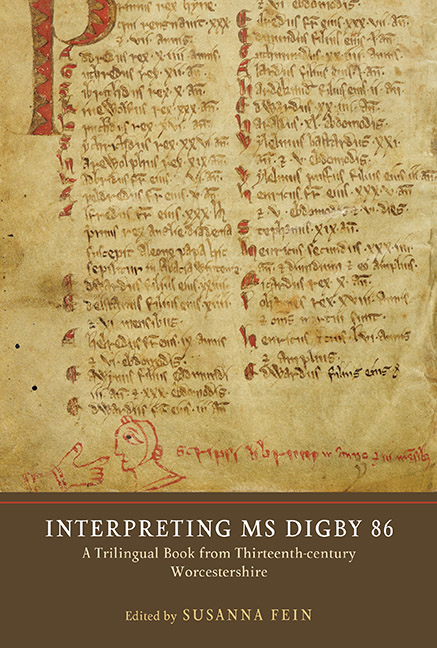Book contents
- Frontmatter
- Contents
- List of Illustrations
- List of Contributors
- Acknowledgements
- Abbreviations
- Digital Facsimiles of Frequently Cited Manuscripts
- The Contents of Oxford, Bodleian Library, Digby 86
- Note on the Presentation of MS Digby 86 Texts
- Introduction
- 1 Fellow Travellers with Saint Nicholas
- 2 Anglo-Norman Religious Instruction in MS Digby 86: Echoes of Lateran IV
- 3 Latin and Vernacular Prayers in MS Digby 86
- 4 Science, Medicine, Prognostication: MS Digby 86 as a Household Almanac
- 5 Literary Therapeutics: Experimental Knowledge in MS Digby 86
- 6 Petrus Alfonsi, the Disciplina clericalis and Le Romaunz Peres Aunfour of MS Digby 86
- 7 Misogyny in MS Digby
- 8 Gender Trouble? Fabliau and Debate in MS Digby 86
- 9 The Middle English Poetry of MS Digby 86
- 10 MS Digby 86 and Thirteenth-Century Scribal Poetics
- 11 The Scarlet Letter: Experimentation, Design and Copying Practice in the Coloured Capitals of MS Digby 86
- 12 Below Malvern: MS Digby 86, the Grimhills and the Underhills in their Regional and Social Context
- Bibliography
- Index of Manuscripts Cited
- General Index
- Manuscript Culture in the British Isles
9 - The Middle English Poetry of MS Digby 86
Published online by Cambridge University Press: 24 October 2019
- Frontmatter
- Contents
- List of Illustrations
- List of Contributors
- Acknowledgements
- Abbreviations
- Digital Facsimiles of Frequently Cited Manuscripts
- The Contents of Oxford, Bodleian Library, Digby 86
- Note on the Presentation of MS Digby 86 Texts
- Introduction
- 1 Fellow Travellers with Saint Nicholas
- 2 Anglo-Norman Religious Instruction in MS Digby 86: Echoes of Lateran IV
- 3 Latin and Vernacular Prayers in MS Digby 86
- 4 Science, Medicine, Prognostication: MS Digby 86 as a Household Almanac
- 5 Literary Therapeutics: Experimental Knowledge in MS Digby 86
- 6 Petrus Alfonsi, the Disciplina clericalis and Le Romaunz Peres Aunfour of MS Digby 86
- 7 Misogyny in MS Digby
- 8 Gender Trouble? Fabliau and Debate in MS Digby 86
- 9 The Middle English Poetry of MS Digby 86
- 10 MS Digby 86 and Thirteenth-Century Scribal Poetics
- 11 The Scarlet Letter: Experimentation, Design and Copying Practice in the Coloured Capitals of MS Digby 86
- 12 Below Malvern: MS Digby 86, the Grimhills and the Underhills in their Regional and Social Context
- Bibliography
- Index of Manuscripts Cited
- General Index
- Manuscript Culture in the British Isles
Summary
BY the accidents of piecemeal publication, the Middle English verse of Oxford, BodL, MS Digby 86 has never been presented as a distinct body of poetry collected in a book by one compiler, nor has it, therefore, been recognised as an authentically medieval anthology in the English vernacular, c. 1280. That an anthologising impulse underlies the material preservation of English verse in Digby is undeniable, for the English portions of the book occur as blocks of continuous verse, first in double columns on fols. 119ra–143ra and fols. 163vb–168vb and then without columns on fols. 195v–200v. The bicolumnar sequence is headed by The Harrowing of Hell (art. 40); the single-column set begins with The Debate between the Body and the Soul (art. 68). These subjects are overtly paired in the somewhat later Harley and Auchinleck manuscripts (c. 1330–40) and they may be implicitly paired in Digby too: their physical separation may be mainly attributable to the scribe's principle of organisation by metre (short line or long line) as he ruled and filled quires with verse texts. Neither Harrowing nor Body and Soul opens a quire, but when the Digby scribe commenced copying in English, in quires xv and xxv, respectively, it was these two eschatologically paired items that he inserted first. Christ harrowed hell that souls may be redeemed and individuals ought to therefore heed well (with dread and hope) what will happen when their souls will eventually part from their bodies.
The Middle English poetry of Digby 86 covers a heterogeneous range of topics, religious to secular, from the most moral and frightening of warnings about hell-fire, to the most debased yet comic worldly ethics of guileful humans and animals in fabliau and fable. I offer here a summary assessment of the English corpus, not wishing to separate it from its trilingual setting so much as simply to establish its place as belonging to our growing understanding of the medieval English lyric sequence. MS Digby 86 holds status as one of the few rare and iconic miscellanies deemed worthy of facsimile treatment by the Early English Text Society and, among such manuscripts of Middle English, it is the only one harkening back to the thirteenth century – hence, it is precedent to the very important early fourteenth-century Harley and Auchinleck manuscripts and long precedent to the late fourteenth-century Gawain and Vernon manuscripts.
- Type
- Chapter
- Information
- Interpreting MS Digby 86A Trilingual Book from Thirteenth-Century Worcestershire, pp. 162 - 196Publisher: Boydell & BrewerPrint publication year: 2019

